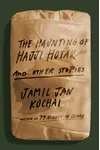Picture an Afghan-American storyteller weaving tales that bridge worlds with wit and wonder—meet Jamil Jan Kochai! Born in a refugee camp in Pakistan and raised in California, Kochai has emerged as a literary star, blending magical realism with raw cultural truths. His debut novel, 99 Nights in Logar, and his short story collection, The Haunting of Hajji Hotak and Other Stories, have captivated readers, earning accolades like the O. Henry Prize and a National Book Award finalist nod.
With a voice that’s both playful and profound, Kochai explores identity, displacement, and the Afghan diaspora, drawing from his own life to craft stories that linger. Ready to dive into a world where folklore meets modern struggles? Let’s explore Kochai’s journey!
The Making of Jamil Jan Kochai
Born in 1992 in Peshawar, Pakistan, Jamil Jan Kochai hails from Logar, Afghanistan, a region that shapes his storytelling. His family fled Soviet-occupied Afghanistan, landing in California when he was just a year old. Growing up in West Sacramento, Kochai spoke Pashto and Persian at home, but faced challenges with English until a transformative second-grade teacher, Susan Lung, helped him excel in reading. A high school teacher later sparked his love for creative writing, setting him on a path to a bachelor’s degree in English from California State University, Sacramento, and master’s degrees from UC Davis and the Iowa Writers’ Workshop, where he was a Truman Capote Fellow.
Jamil Jan Kochai’s Unforgettable Stories
Kochai’s debut novel, 99 Nights in Logar (2019), follows Marwand, a 12-year-old Afghan-American boy returning to Afghanistan, embarking on a quest to find a runaway dog. This coming-of-age tale, infused with Pashto folklore and humor, was a finalist for the PEN/Hemingway Award and the DSC Prize for South Asian Literature. Critics praised its vibrant storytelling and cultural depth.
His 2022 short story collection, The Haunting of Hajji Hotak and Other Stories, is a tour de force, earning a National Book Award finalist spot and winning the Aspen Words Literary Prize. Stories like “Playing Metal Gear Solid V” blend video game surrealism with war’s trauma, while “Occupational Hazards” uses a résumé format to trace an Afghan immigrant’s struggles. Kochai’s style—dreamlike, fragmented, and emotionally raw—merges magical realism with stark realities of war and displacement, often reflecting his family’s experiences during the Soviet occupation.
His short stories have graced The New Yorker, Ploughshares, and The Best American Short Stories, showcasing his versatility. Kochai’s essays in The New York Times and Los Angeles Times further amplify Afghan voices, tackling themes of loss and resilience with a poet’s touch.
Why Jamil Jan Kochai Matters
Kochai’s work is a vital addition to contemporary literature, offering a rare Afghan-American perspective. His stories humanize the Afghan diaspora, challenging stereotypes and illuminating the emotional toll of war and migration. By weaving folklore with modern narratives, he preserves cultural heritage while engaging global readers. His experimental flair, like turning a résumé into a story, pushes literary boundaries, inspiring new voices in multicultural fiction.
As a Hodder Fellow at Princeton and former Stegner Fellow at Stanford, Kochai continues to shape the literary landscape, proving that stories can bridge divides and heal wounds. His impact lies in his ability to make readers laugh, cry, and reflect—all in a single page.
- Born: 1992, Peshawar, Pakistan
- Key Works: 99 Nights in Logar, The Haunting of Hajji Hotak and Other Stories
- Awards: O. Henry Prize, National Book Award Finalist, Aspen Words Literary Prize
- Fun Fact: Kochai once believed crossing a prayer rug could turn him into a monkey, a belief that inspired a story!
Snag 99 Nights in Logar or The Haunting of Hajji Hotak and dive into Jamil Jan Kochai’s magical, moving world of Afghan-American storytelling!

